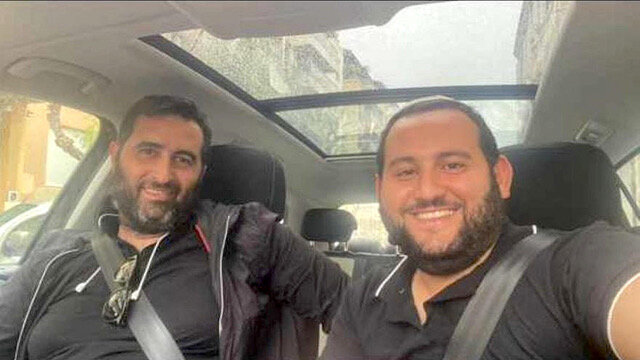Lag B’Omer terror claims lives at Tunisia shul, but security prevents greater catastrophe
A terrorist murdered five people at a Lag B’Omer celebration in an historic synagogue on the Tunisian island of Djerba late on Tuesday, as security personnel outside the shul prevented a larger massacre.
The gunman killed two Jews and three security people, and injured eight others.
Two of the dead were Jewish cousins who had traveled to Djerba from France and Israel to the El Ghriba shul for Lag B’Omer. They were identified as Aviel Hadad, H’yd, 30, a Tunisian citizen living in Netivot, Israel, and Benjamin Haddad, H’yd, 42, who lived in France.
The three other dead were Tunisian security officials, according to Tunisia’s foreign ministry.
While the Djerba festivities typically attract mostly people with Tunisian ties, this year’s drew US ambassador to Tunisia Joey Hood and Deborah Lipstadt, US envoy monitoring antisemitism, who attended on Monday.
The event has grown substantially in recent years, as memories faded of a 2002 truck-bomb attack on El Ghriba by Al-Qaeda that killed 21. It was also the site of a firebombing in 2018.
Tuesday’s attack was committed by a Tunisian national guard member who appeared to fire randomly at people near the El Ghriba synagogue before being neutralized. The Jewish cousins were killed in the El Ghriba parking lot.
The Tunisian government invested in a resurgence of the pilgrimage, billing it as a symbol of the country’s tolerance, and provided intense security.
Tuesday’s event is “a death blow, at least for the foreseeable future, to a beautiful tradition and pilgrimage, and it is causing palpable pain,” Avi Chana, a French-Israeli Jew who was born in Tunisia and has participated in the pilgrimage, told the Times of Israel. “This is dealing the pilgrimage a mortal blow.”
About 1,000 Jews are estimated to live in Tunisia, one of the only continual Jewish communities in the Arab world. Most of Tunisia’s Jewish population, estimated at over 100,000 prior to 1948, left the country for Israel or France by 1970.
There were several hundred — possibly 1,000 — Jews inside the shul at the time of Tuesday’s shootings. They were kept in lockdown for about four hours before being evacuated under heavy security to their homes and hotels.
“We had a great neis here yesterday,” a Djerba community leader, Rav Aharon Mazuz, said Wednesday morning. “A major massacre was avoided because the shooter was prevented from entering the shul. This is the third attack on the shul and we are in contact with the authorities regarding security measures. None of the Jews in Djerba are leaving their homes today. All the businesses are closed.”
Rav Baniel Hadad, a cousin of the victims who lived in Djerba until three years ago, said: “Relations with our Arab neighbors are excellent, and there are even friendships. But beneath the surface there is enmity. The Lag B’Omer event is the main event in Djerba and hundreds of people come from throughout North Africa, Europe and Israel. The Arabs also participate.
“This attack has caused great fear in the Jewish community.”
The El Ghriba synagogue is in the former Jewish village of Harah Sghira.
Some believe that the synagogue — or at least, its antecedent — dates back to the exile after the destruction of either the First Temple (586 BCE) or the Second Temple (70 CE). The current building is late 19th century, apparently on the site of a former sixth-century synagogue.
According to one tradition, the community wsas established by a group of Kohanim who settled on the island immediately after the destruction of the first Bais Hamikdash. The tradition holds that the refugees brought a door and a stone from the destroyed Bais Hamikdash with them.
The La-Croix news site reported that Jews who visit the shul “light candles before entering a small cave where the stone of Solomon's Temple is supposed to be located. They then exchange dried fruits and sweets around a prayer."
The five-day pilgrimage around Lag B’Omer begins on 14 Iyar in memory of Rabbi Meir Baal HaNess, and continues until 18 Iyar, in memory of Rabbi Shimon Bar Yochai.
During the lockdown, the Jerusalem Post communicated by DM with a community member named Aitan who said that "there is great panic here. We are in lockdown in the synagogue and also in the guesthouse near the synagogue."
More than an hour after the attack began, Aitan tweeted that "the attack is not over. We hear [gun] shots. There are dead people. We are still besieged in the synagogue. Let's hope everything will be fine. Please pray for us."
The Israeli Foreign Ministry contacted Israelis in the area and received real-time reports. One of the Jews in the shul at the time was former Yamina MK Yomtov Kalfon, Yeshiva World News reported.
Video footage shared on social media appeared to depict loud gunshots that were audible within the synagogue complex.
"In Tunisia, where Muslims, Jews and Christians have lived side by side for centuries, pilgrims from around the world gathered on the island of Djerba last night for the annual Lag Ba’omer celebration," the US embassy posted on Tuesday, before the attack.
Afterwards, Lipstadt said on Twitter, “I am sickened and heartbroken by the lethal, antisemitic attack targeting the Ghriba synagogue in Djerba during the Lag B’Omer celebrations, with thousands of Jewish pilgrims in attendance.”
US State Department spokesman Matthew Miller condemned the killings, writing on Twitter that Washington “deplores the attack in Tunisia coinciding with the annual Jewish pilgrimage that draws faithful to the El Ghriba Synagogue from around the world. We express condolences to the Tunisian people and commend the rapid action of Tunisian security forces.”






